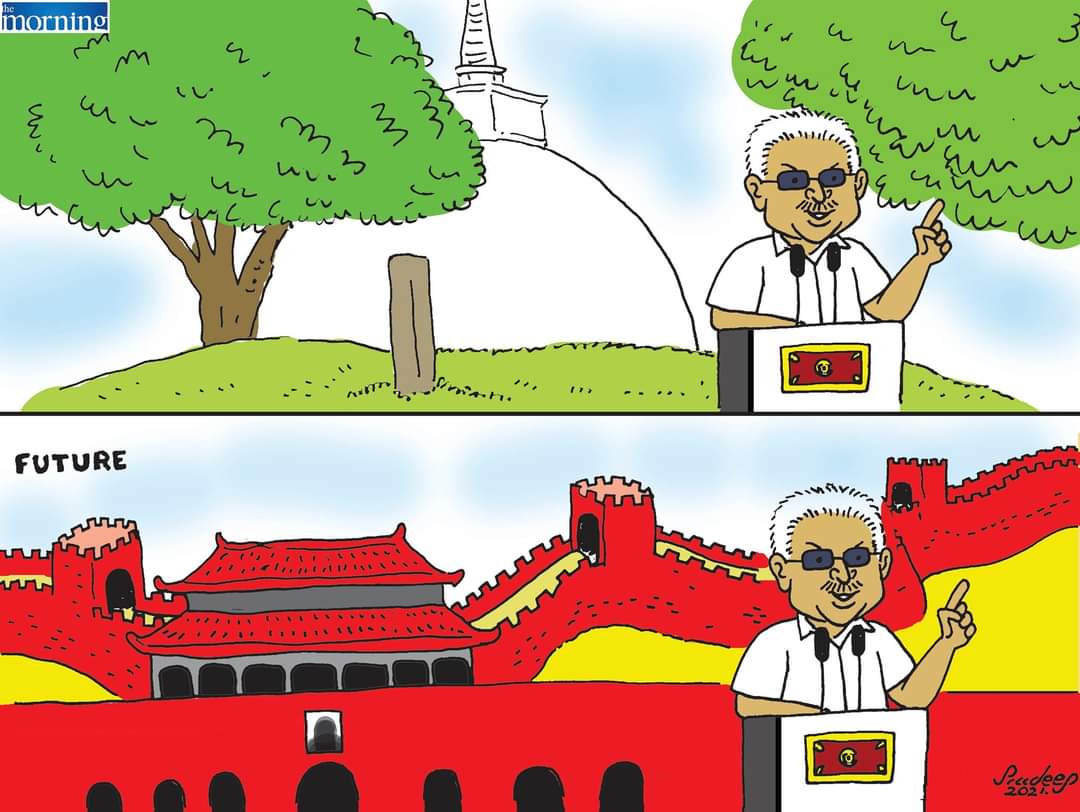From the time the pandemic struck last year, China has topped the charts in providing crucial and timely support to Sri Lanka — by way of over $ 2 billion in loans and a currency swap, and Sinopharm vaccines totalling over a million in donation, and about six million for procurement so far. However, despite the past and pandemic-time assistance, China is under more public scrutiny in the island nation than ever before.
This is significant, because in Sri Lanka’s Sinhala nationalist political landscape, resistance to the “imperialist” West, and “interventionist” India is a popular political position, dominating rhetoric in the country’s Sinhala-majority south, since its Independence in 1948, through its civil war years, and the decade after. But the growing scepticism of China, in public discourse and the media – including cartoons alluding to the dragon or Chinese flag – is relatively new.
The sentiment came to the fore in May this year, when the government passed a controversial Bill governing the China-backed Colombo Port City, and during recent controversies over sign boards in public places and government offices that included mandarin while excluding Tamil, a national language in Sri Lanka. In resistance to the Port City Bill, Sri Lanka’s influential Buddhist monks said they would never allow a “Chinese colony” in their country.
What has changed in how Sri Lankans perceive their country’s relationship with the Asian giant?
Karunasena Kodituwakku, Sri Lanka’s former Ambassador to China during the previous government, blames the Rajapaksa administration. When the country takes pride in its “non-aligned” foreign policy legacy, to see Sri Lankans calling the Port City a “Chinese colony” brings a “very negative connotation” to the project, Mr. Kodituwakku said.
“The Port City is a good investment for Sri Lanka. The former government too wanted the project, to develop the country into a regional financial hub. The current administration should have handled it in a mature way and built national consensus on it. They failed to do that,” he told The Hindu. “They should have passed laws after discussions with all domestic stakeholders. If you look at Sri Lanka’s history, all important international accords and agreements were inked only after ensuring bipartisan consensus.”
Former Foreign Secretary Prasad Kariyawasam said given its geographic location, Sri Lanka has maintained friendly relations with maritime nations, including China, since ancient times. Such relations have always had “a sense of strategic content”. Post-independence Sri Lanka has been circumspect “to avoid a zero-sum approach” in relations with foreign partner nations, thus striving to maintain equally close relations with all countries in both word and deed, he pointed out. But the traditional friendship between Sri Lanka and China has now become “more nuanced”, he noted, with “unique, unprecedented characteristics in the bilateral relationship”, displaying a “special partnership”, especially at the level of two governments.
Pointing to a possible perception shift, from China being seen as a “partner and collaborator”, to a “competitor” now, Mr. Kariyawasam said: “The fact that the 21st century export-oriented China is not only a development assistance partner, but a competitor with trade, industrial and human resources interests of Sri Lanka and its several other foreign partners, appears to be making the relationship increasingly challenging, especially in the minds of the public, raising their concerns with respect to the fundamental framework of the democratic nature of the Sri Lankan State as well.”
The new dynamic could also have political costs domestically, according to Tamil Progressive Alliance (TPA) Leader and Opposition MP Mano Ganesan. Sinhalese people, he said, are feeling “let down” after supporting the Rajapaksas based on their promise that “they will not sell national assets” to other countries. “The term “selling” could be tricky, but for all practical purposes, we have a Chinese State-run company with substantial control in the Port City for a long time to come, and the government enacted a Bill endorsing that,” he said.
Further, reading Chinese engagement in relation to Sri Lanka’s plural context, in Mr. Ganesan noted that China “appears ignorant” of the ethnic and religious diversity in the island nation. “If they [Chinese] wish to win the Tamils’ confidence, they have to acknowledge that we are a diverse country with different ethnic and religious groups, not an entirely Sinhala-Buddhist country,” Mr. Ganesan said, reiterating his remarks in his statement, following TPA’s recent meeting with the Indian High Commissioner in Colombo. “China’s presence in Sri Lanka is not just India’s national security concern. Tamils view China with suspicion because we wonder if they accept us as Sri Lankans,” the statement issued on Tuesday said.
All the same, Tamils also “greatly appreciate” India’s geopolitical concerns. “We are in South Asia, and in that sense, India is immediate family and China is a distant relative. So, when I think of the Chinese having controlling stakes in the southern part of our island, I am reminded of the Cuban missile crisis and its consequences,” Mr. Ganesan told The Hindu.
Voicing a similar sentiment in Parliament this week, Tamil National Alliance Jaffna district legislator S. Shritharan spoke of alleged attempts by China and Pakistan to work in projects in the islands off Jaffna peninsula. “Do not instigate India in this manner,” he told the government. “No matter how many problems we face, Tamils will always stand with India, with whom we have an organic link,” he said.


